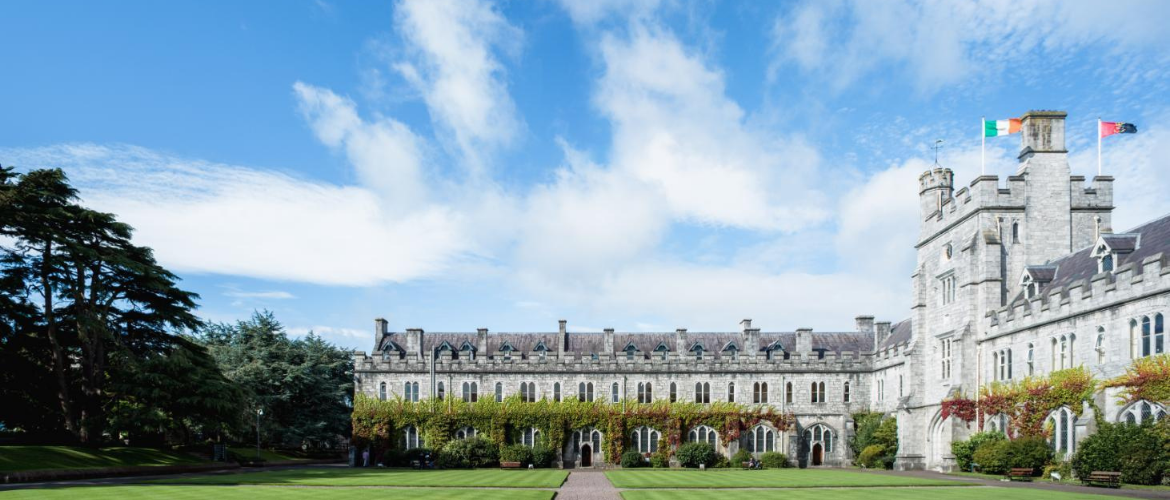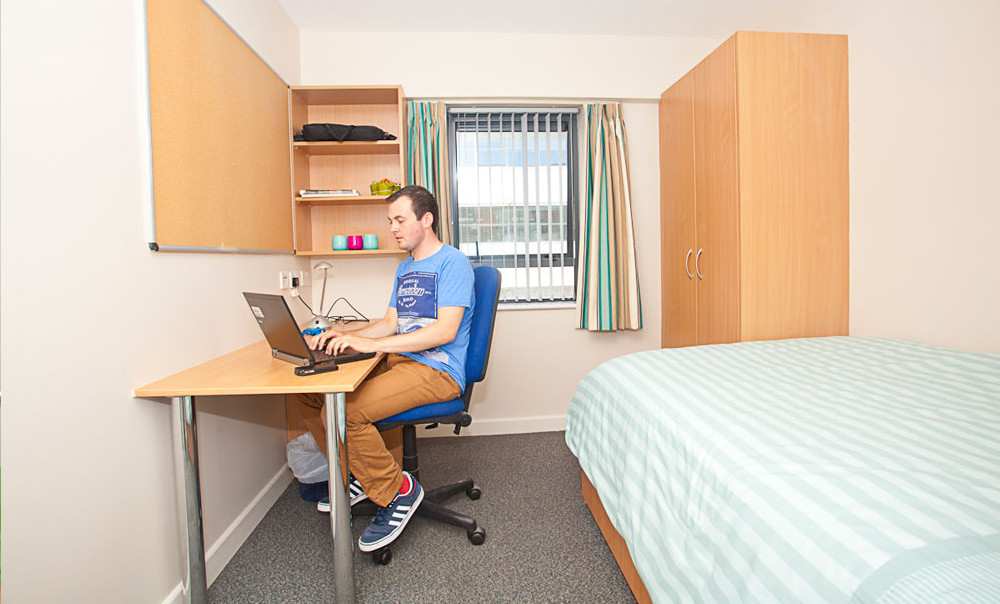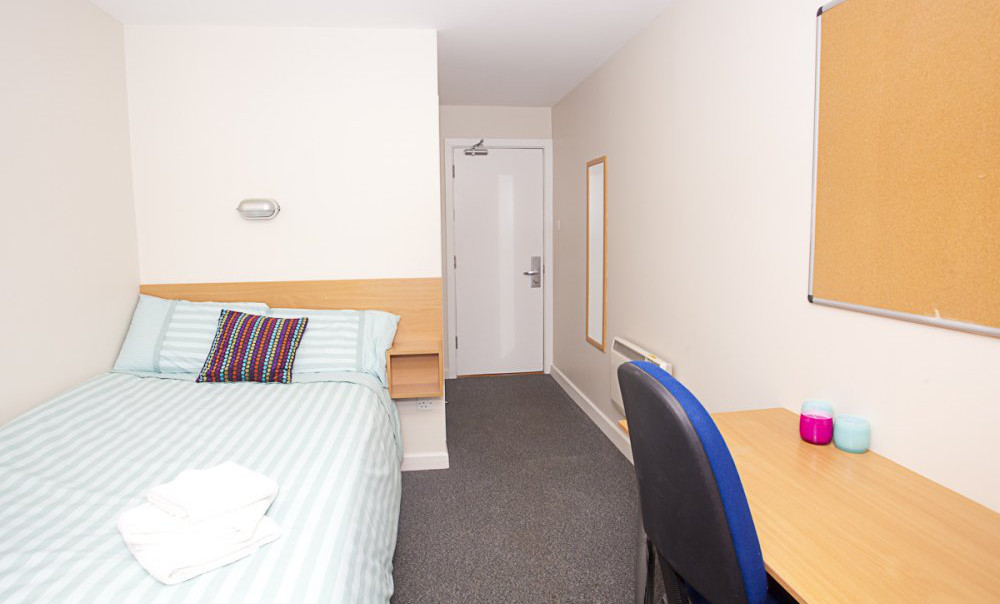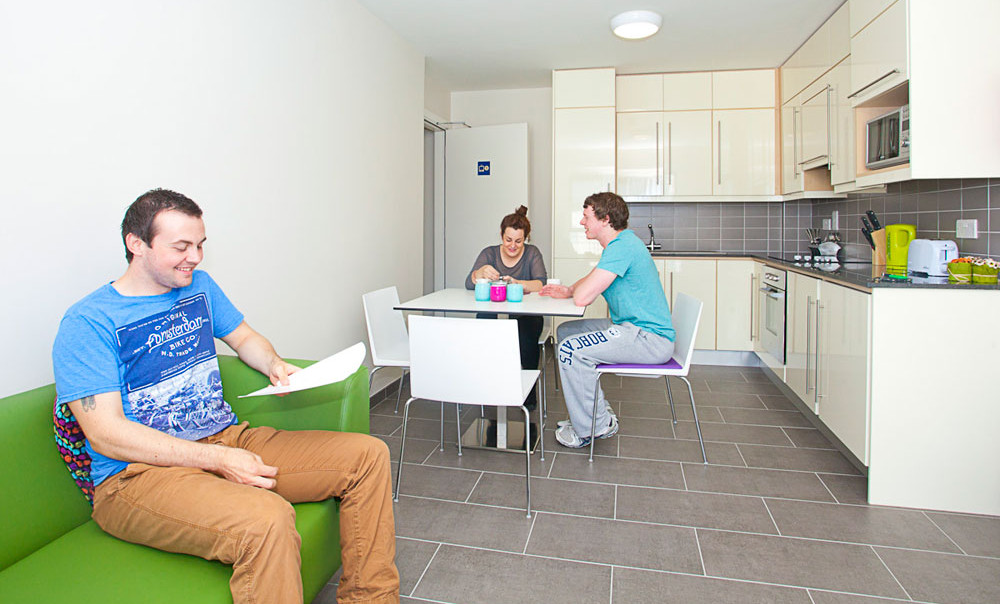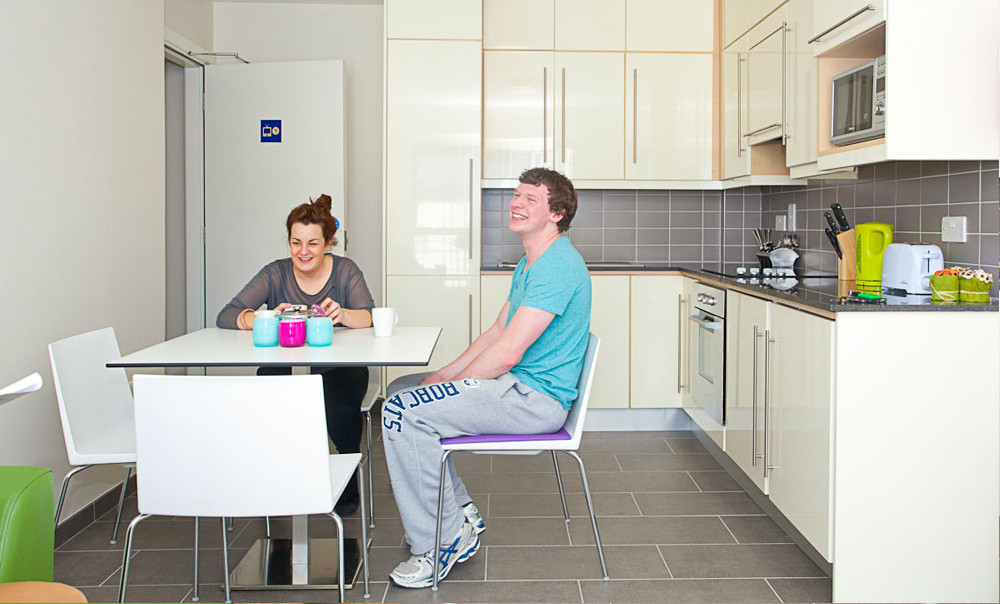The George J. Mitchell Peace Scholarship honors the Northern Ireland peace accord brokered by Senator Mitchell between the governments and peoples of Ireland and the United Kingdom. The accord was reached on Good Friday, April 10, 1998, and accepted by vote of the citizens of Ireland and Northern Ireland on May 22, 1998.
The Peace Scholarship is an agreement between Maine and Ireland for a student exchange at the university level. UMF students will study at the University College Cork in Cork, Ireland. The first George J. Mitchell Peace Scholarship exchanges took place during the 1999-2000 academic year.
University College Cork
The University College Cork (UCC), built around a beautiful stone-faced quadrangle, was founded in 1845, making it one of the oldest universities in Ireland. The university has four colleges: Medicine and Health; Business and Law; Science, Engineering, and Food Science; and Arts, Celtic Studies, and Social Sciences. Over 17,500 undergraduate and postgraduate students take courses in more than 60 different departments. The campus is a combination of early and modern architecture located in a wooded riverside setting close to the city center. The university is a constituent of the National University of Ireland and strongly emphasizes research while maintaining close connections with industry and the local community. University College Cork has been selected as Ireland’s University of the Year by The Sunday Times. The award, for the third time, follows on the heels of UCC becoming the only Irish university to achieve the unique status of Ireland’s first five-star university and improving its position in the QS World University Rankings.
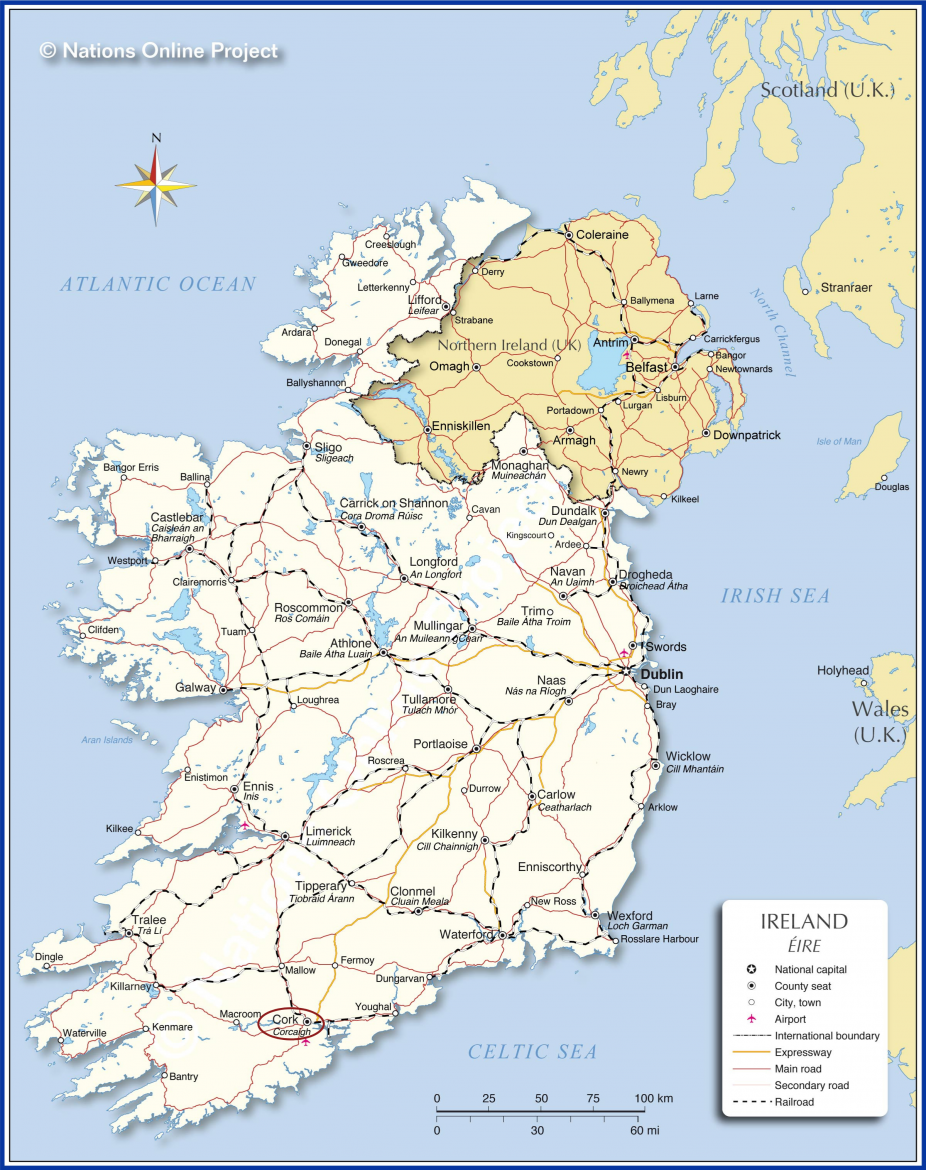 Ireland
Ireland
Ireland is an island politically divided into two parts: the sovereign Republic of Ireland and Northern Ireland of the United Kingdom. The “Emerald Isle” earns its name from its lush green landscape and mild, changing climate. From coastal mountains to inner plains, to rocky shores, Ireland’s rich landscape can only be described as picturesque. Ireland has a rich cultural history dating back from the ice age to the Stone Age, to the Bronze Age, the Iron Age, and so on. If history is not your area of interest, there are always sports. Hurling and football remain the most popular sports among the Irish and fans take their championship games very seriously. Irish poetry is still very popular and dates back to the 6th century. If you are up for an Irish jig, folk music and dance are a widely spread tradition around the island. From castles to abbeys, to cliffs overlooking the Celtic sea, to rowdy rugby fans and musicians of all sorts, Ireland offers the best of all worlds and will be an experience not soon forgotten.
Cork
Cork, the second-largest city in Ireland, is located on the south coast of the island. The city is a busy seaport and the home of a large number of industries including electronics, pharmaceuticals, brewing, and food processing. Named the European Capital of Culture in 2005, the city was praised by Lonely Planet as one of the top 10 cities in the world to visit; the city boasts international arts, film, and jazz festivals, lively performing arts, and a growing artisanal culinary culture of cafes, restaurants, markets, and boutiques. Cork is situated at the head of the inlet of Cork Harbor with the sea just to the south, mountains, hills, and river valleys to the north and east, and the well-known Lakes of Killarney a couple of hours to the west.
Areas of Study
Anthropology (Archaeology, Cultural Studies, and Folklore), Art History, Biochemistry, Biology, Botany, Business (Accounting, Finance, Management, Marketing, and MIS), Chemistry, Classical Studies, Computer Science, Earth Science, Economics, Education, Engineering (Bioengineering, Civil, Chemical, Electrical, and Mechanical), English, Environmental Sciences, French, Food Science and Nutrition, Geography, German, History, International Affairs (Asian, Celtic, Chinese, European Studies), Mathematics, Microbiology, Music, Philosophy, Physics, Political Science, Psychology, Social Work, Sociology, Spanish, Theater, and Zoology.
More about Areas of Study for the US and Non-EU Visiting Students
Academics
UCC offers a large selection of courses (called modules at UCC) across many majors. Exchange/Visiting students have access to a special set of modules designed specifically for them, and can also request access to the regular modules if they meet the prerequisites and there is availability. Browse available courses in the Book of Modules for Visiting Students. IMPORTANT: Be sure to use this link and not the general book of modules on the UCC website.
Click here for general information about modules and a key to the terms used in module descriptions.
UCC Semester 1 = UMF fall semester; UCC Semester 2 = UMF spring semester
Students should pay close attention to the semester designation of courses, and avoid full-year courses that continue from semester 1-2.
Full-time enrollment:
30 UCC/European Credit Transfer System (ECTS) credits each semester = equals 15 UMF credits.
UMF Students must enroll in a minimum of 12 UMF credits equivalence per semester, with maximum enrollment of 15 credits.
Transfer credits:
5 UCC/ECTS = 2.5 credits at UMF
10 UCC/ECTS = 5 credits at UMF
Grading Scale
UCC Grade |
UMF Equivalent |
| 70 – 100 | A |
| 65 – 69 | A- |
| 60 – 64 | B+ |
| 55 – 59 | B |
| 50 – 54 | B- |
| 40 – 49 | C |
| 0 – 39 | No credit |
Academic Calendar
Fall Semester runs late-September to mid-December. Study review week runs one week in early January, followed by a week of final exams.
Spring Semester runs late-January to late-April, and includes a two week Easter holiday. Study review week runs the last week in April, followed by two weeks of final exams.
NOTE: The spring semester calendar may not allow for final semester Seniors to participate in UMF Commencement. This would be determined by the final assessment requirements of the courses (modules) selected.
More about UCC Semester Dates. Click on Visiting the US and Non-EU Orientation and Semester Dates.
Program Cost
The scholarship covers:
- tuition and fees for a minimum of 12 and a maximum of 15 credits per semester (UCC)
- university housing w/ utilities (UCC)
- partial meal stipend (UCC)
- $1000 scholarship to use toward airfare reimbursement and residence permit (UMF)
Students who are awarded the scholarship will be responsible for:
- additional meal costs
- textbooks at UCC
- Irish immigration registration (residence permit)
- local transportation
- personal expenses
Housing
Accommodation is available for visiting students in campus housing at Victoria Lodge. Public transportation is available outside apartment complexes to and from the city center. The apartments include WiFi, TV, and a fully furnished living area and kitchen. The living space is shared, with 3 to 6 attached bedrooms, occupied by other international and local students.
More about Accommodations and Victoria Lodge
Eligibility
- Be age 18 or older and be eligible for international travel at the time of the exchange.
- Be a U.S. Citizen.
- Be a Maine resident for at least one year by the application deadline (paying in-state tuition).
- Have demonstrated leadership skills and a commitment to community service.
- Be a full-time, matriculated, undergraduate student at the University of Maine at Farmington.
- Have successfully completed 24 credits in residence at UMF by the application deadline. AP, early college, and transfer credits are not considered.
- Have a cumulative grade point average of 3.0 or higher.
- Good disciplinary and academic standing. No Incomplete grades at time of application or during program.
Award Period
Scholarship recipients will participate in the exchange at the University College Cork (UCC) for one semester.
Applications are now being accepted for a Fall 2025 or Spring 2026 award, with an Application Deadline of February 20, 2025.
Selection of Scholarship Recipients in March/April 2025
How to Apply
Students must meet with the Study Abroad Advisor prior to applying in order to review scholarship eligibility, requirements and award.
The application process is almost completely online, with the exception of a few select forms.
The following documents will need to be prepared in advance, saved in the appropriate file format, and submitted via the online application.
1. Essay – Please explain the connection between your studies abroad and your academic major, including why you have selected this specific program, what linguistic and/or cultural components affected your decision, and how you expect the program will contribute to your education, personal growth and future career plans. Highlight your leadership/community/volunteer experiences, as well as how you will use this experience to benefit others through leadership and community service. Your uploaded document must include your name on the first page and be no more than two pages in length. (pdf)
2. Unofficial Transcript – download student copy from your Mainestreet Student Services Center. (pdf)
3. Copy of valid passport (information page) or copy of receipt from submitted passport application. (pdf)
4. Study Away Budget Estimate-Financial Resources Form – Download Excel file here. Once you have completed the budget estimate information, save the form again and email it to leustis@maine.edu. Your form will be reviewed, updated with any necessary changes, signed by the study abroad advisor and emailed back to you. You will then use that version to discuss with a Financial Aid Officer and complete the financial resources section and obtain a signature from FAO. (Excel)
5. Study Away Form – download from MyCampus, UMF Tools, Forms and Documents. (pdf)
6. Resume (pdf)
The following are additional submissions/processes required to complete your application.
- UMF Study/Intern/Teach Away Conduct Review Form – Submit this Google form
- UMF Study/Intern Abroad/Away Faculty Reference Form – Provide this form link to your faculty of choice for an academic reference: https://forms.gle/Thk3R99beGmTbZ946.
- Community Involvement/Service Reference Form – Provide this form link to the community member from whom you are requesting a reference attesting to your participation in community service: https://forms.gle/JrwsmLqqofMZS9Rm7.
Request application password from Office of Global Education
Helpful links


